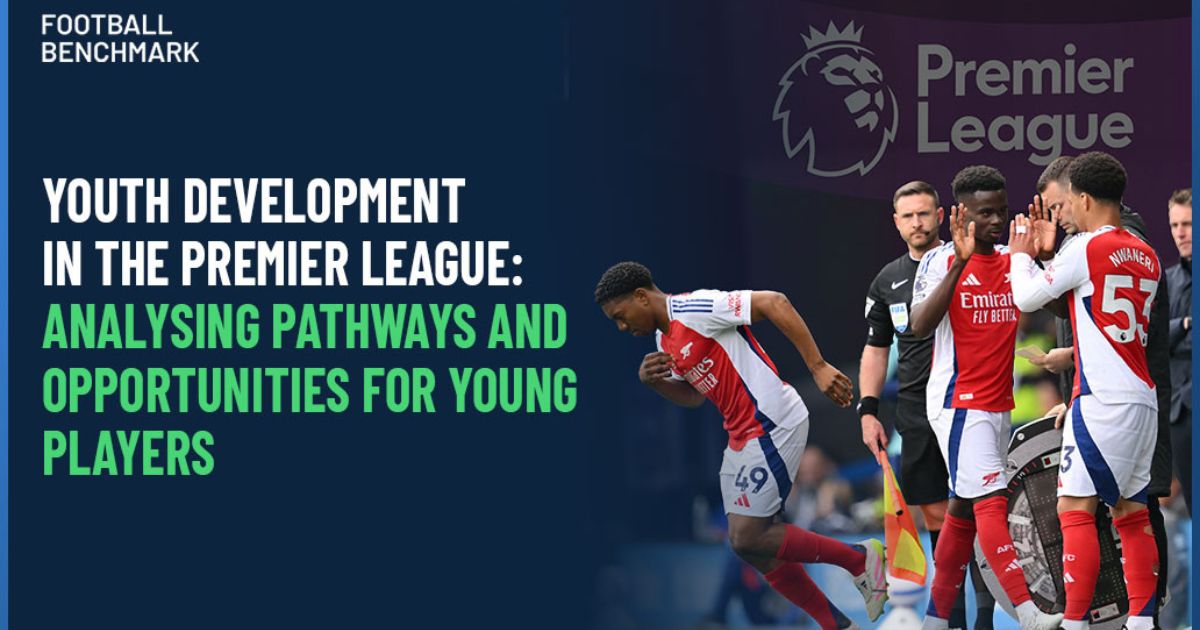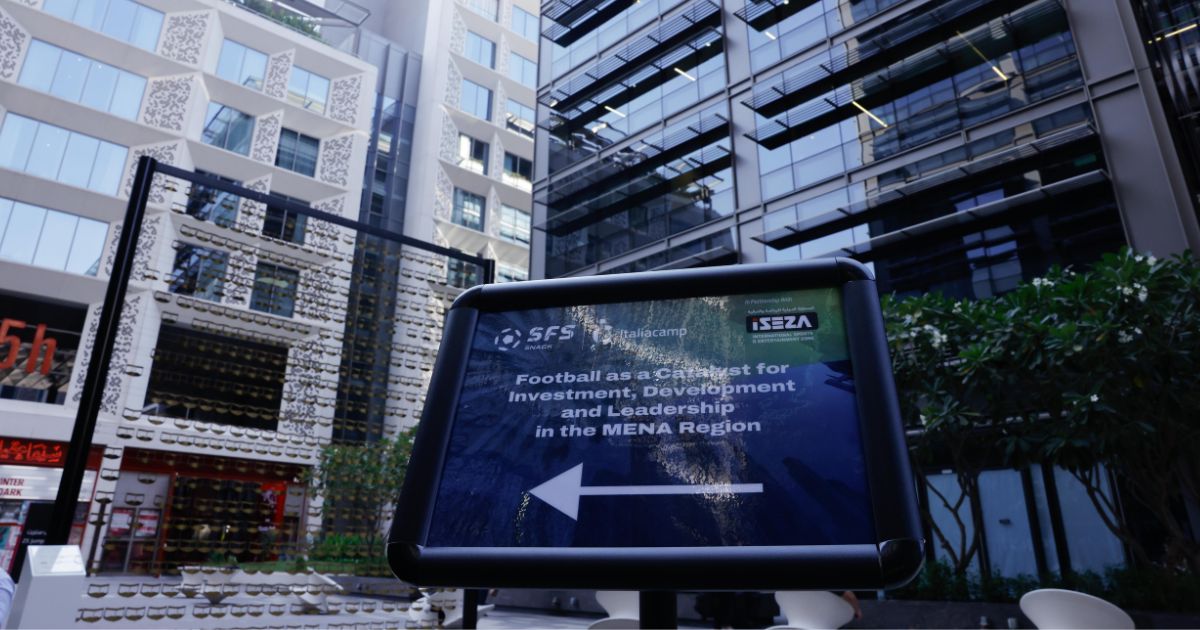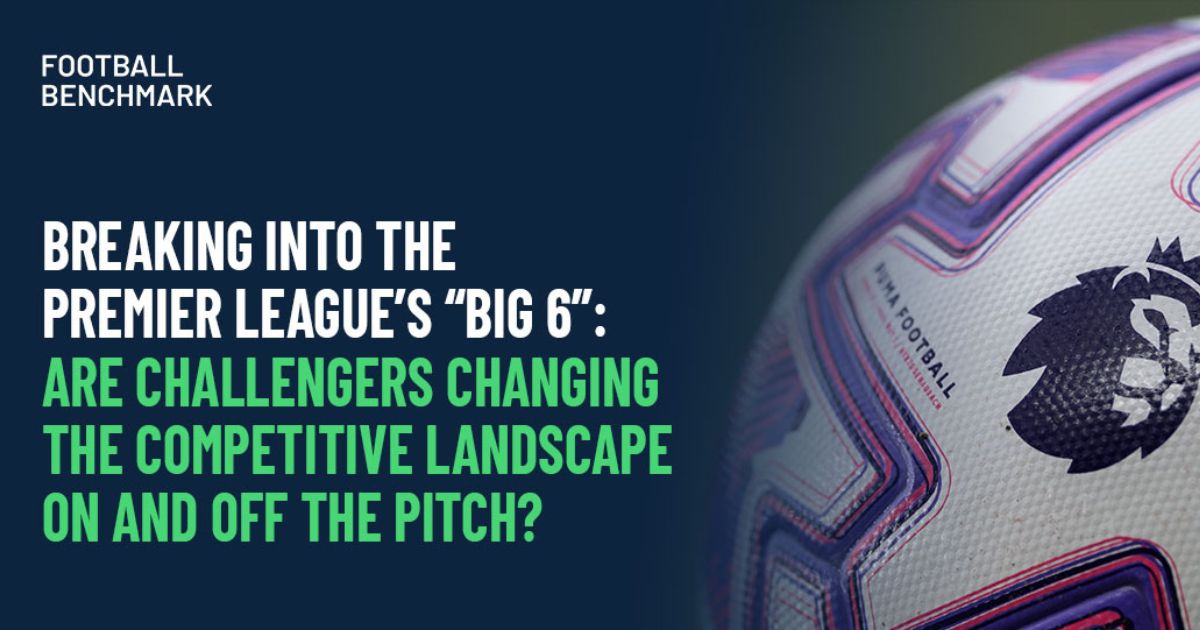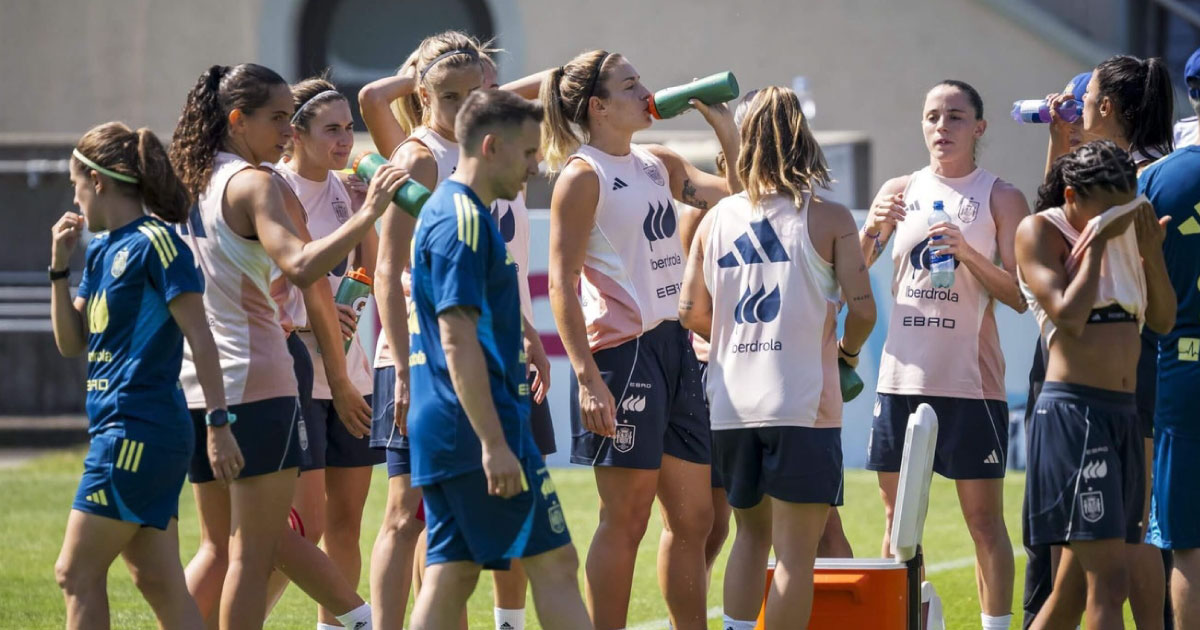Article written by Football Benchmark
The Premier League is recognised worldwide as the most competitive and lucrative domestic competition. Alongside its record revenues, the league and English football more broadly have accelerated their progress in youth development in recent years. England’s U21 side secured its second successive UEFA U21 EURO title this summer, while players such as Liverpool’s Rio Ngumoha and Arsenal’s Max Dowman are making first-team debuts before turning 17. At the same time, at the highest level of the game, clubs are committing major resources to youth development, a central pillar of club strategic planning.
At industry level, youth football’s importance is only growing. On the pitch, younger players are now contributing more minutes than ever before, while off the pitch, they represent valuable assets, both in terms of transfer value and their role in long-term squad planning. These developments make it essential for clubs to balance immediate competitiveness with investment in the future. While exceptional talent can be unearthed across the world, domestic player development systems remain decisive in shaping pathways, with investment, opportunity and structured frameworks all influencing long-term success.
This article assesses the evolution of playing opportunities of U21 players in the Premier League, the differences between clubs, and the share of minutes given to domestic players. The central question is whether the league has found the right balance between short-term success and long-term development.
Evolution at league level
Recent regulatory changes have reshaped the environment for young players in the Premier League. The introduction of the five-substitution rule, new Governing Body Endorsement (GBE) criteria following Brexit, tighter enforcement of domestic financial sustainability rules, and mounting fixture congestion have all prompted clubs to reconsider their approach to squad planning. Combined with the systemic trends behind the growing importance of young players in general, these changes have created conditions in which younger players are gaining more opportunities.

The trend is clear in the data. U21 players accounted for 9.9% of total league minutes in 2020/21, with 98 different players featuring. By 2023/24, this figure had risen to 13.9% of minutes and 145 players, before settling slightly lower at 12.8% and 128 players in 2024/25.
Three key factors drive the peak of 2023/24. First, matches became significantly longer following the introduction of stricter stoppage-time rules. According to Premier League data, the average game time increased, creating a significant number of additional minutes across the season. A large share of these were allocated late in matches, often to younger players, giving them more opportunities than in previous years.
Second, the rise reflects the convergence of the new, expanded substitution rules (resulting in the expansion of the playing squad used for longer first team matches), the impact of Brexit (limitations in foreign recruitment) and growing financial constraints. While none of these happened directly before the season, it took time for clubs to catch up with this new market reality.
Third, playing time was heavily influenced by the presence of a select group of extraordinary young players who became core starters for their clubs. The 30 most-used U21 players collectively played more than 10,000 additional minutes compared with 2022/23. On the one hand, this highlights how “playing opportunities” cannot simply be measured by minutes statistics, but instead should be cross-analysed with the number of different players who receive these opportunities. On the other hand, it also shows a recent increase in the number of exceptional talents flowing into the Premier League, who are trusted with minutes, even with high competitive expectations.
Comparisons across clubs
At club level, we can observe mixed strategies. While several clubs have made U21 integration a consistent part of squad planning, others have relied almost exclusively on established senior players. On average, only around 1.5 U21 players per club have reached 1,000 minutes of playing time in a season, highlighting the limited availability of meaningful opportunities.

Brighton and Chelsea stand out clearly at the top in terms of playing opportunities. Brighton allocated 44,880 minutes to U21 players across the five seasons analysed, equivalent to 21.6% of their total league minutes, while Chelsea followed closely with 41,232 minutes or 19.9%. Together, they are the only two clubs to consistently allocate around one-fifth of their minutes to U21 players, averaging more than 8,000 minutes per season. They are followed by Arsenal (31,485 minutes, 15.3%), Manchester United (27,036 minutes, 13.1%), Wolves (25,339 minutes, 12.2%), Crystal Palace (22,948 minutes, 11.2%) and Tottenham (22,906 minutes, 11.1%). Interestingly, four of the “Big Six” clubs appear in the top half of this ranking.
At the other end of the scale, Aston Villa (10,620 minutes, 5.1%) and West Ham United (6,669 minutes, 3.2%) provided the least U21 playing time, with Newcastle United (16,011 minutes, 7.7%) also sitting near the bottom. In these clubs, the scarcity of opportunities reflects both limited minutes and a narrow distribution of playing time, with fewer than three youth players featuring per season on average.
The breadth of opportunity also varies significantly. Brighton fielded 32 different U21 players over this period and Chelsea 35, far ahead of most of their peers. By contrast, Arsenal’s 15.3% share of U21 minutes was overwhelmingly concentrated in a handful of exceptional talents: Bukayo Saka, Gabriel Martinelli, Emile Smith Rowe and William Saliba together accounted for close to 80% of the total. At Crystal Palace, five players were responsible for 88% of the club’s U21 minutes.
While clubs like Brighton and Chelsea have created a genuine breadth of opportunity, with multiple players gaining meaningful exposure, others have relied on a small core of high-performing young players, generating strong headline numbers but offering fewer chances for wider groups of talent. The broader trend reinforces the reality of the Premier League: the very best young players can accumulate significant playing time, but for most others, opportunities remain limited.
Domestic vs. international talent
Another key question when evaluating league-wide development success is to determine who exactly these minutes go to. A crucial part of any domestic development system is the ability to identify local talent and enhance the competitiveness of national teams.

Looking at the data, while the overall volume of U21 playing time has grown, the share allocated to English players has actually declined. In 2020/21 and 2021/22, domestic players accounted for a majority of U21 minutes, peaking at 63.9%. However, in 2022/23, English players represented just 26.8% of U21 minutes, recovering slightly to 37% in 2023/24 and 32.5% in 2024/25. By contrast, international players accounted for more than two-thirds of all U21 minutes last season.
This shift reflects the Premier League’s unmatched capacity to attract elite young talent from abroad. Clubs are increasingly turning to young international recruits, either by signing those who had already broken into first teams abroad or by promoting foreign players who spent part of their development in English academies. The GBE system, introduced after Brexit, was intended to manage the flow of overseas players. Yet, in practice, the combination of high level of competitiveness, global scouting reach, strong financial resources, and the appeal of the Premier League has ensured that international players continue to secure a large share of opportunities.
In 2024/25, 12 Premier League clubs gave less than half of their U21 minutes to domestic players, and two clubs (Aston Villa and Nottingham Forest) did not provide any first-team minutes to English U21 players at all. At the same time, the England U21 national team continues to perform at a high level, but the shrinking proportion of domestic playing time at club level raises questions about sustainability in the long term.
A market-driven youth boom
Opportunities for U21 players in the Premier League are increasing, but challenges around youth development in the league remain. Much of the growth has been market-driven, shaped by rising player values, fixture congestion, substitution rules, GBE restrictions and financial regulations, rather than a philosophical change in approach. The peak in 2023/24 showed how much figures depend on a small group of exceptional players, many of whom are not English.
Even so, the trajectory is positive. Premier League clubs’ strong commitment and investment in youth development, combined with England’s Elite Player Performance Plan, has built one of the strongest national development systems in Europe, producing increasingly more success stories than a decade ago. The country’s U21 EURO title and the emergence of top-end talent underline the strength of the domestic pathway. At the same time, clubs such as Brighton and Chelsea show how youth integration can provide both competitive strength and financial sustainability within the Premier League’s regulatory and financial environment.
Viewed in a European context, according to UEFA’s Club Talent and Competition Landscape report, the Premier League sits slightly below the continental average in youth minutes but compares favourably with its closest peers, ranking behind only France among the “Big Five” leagues. The sharper contrast is with developer leagues such as those in Belgium, the Netherlands, Portugal, Denmark, Switzerland, and Austria, which systematically provide more opportunities at younger ages. These leagues serve as transitional markets feeding talent into England, while the Premier League itself remains a destination for proven young players rather than a platform for early breakthroughs.
The Premier League’s youth development story is therefore one of progress without perfection: a system that produces more talent than ever and offers strategic opportunities for clubs, but where competition ensures that playing time remains concentrated and heavily shaped by exceptional individuals.
At Football Benchmark, we support clubs, leagues, and investors in understanding the strategic role of youth development and its impact on sporting and financial performance. Through our data platforms and advisory work, we help clients assess pathways, benchmark strategies against peers, and identify opportunities for sustainable growth in a market where youth development has quickly become a decisive factor both on and off the pitch.
Youth development in the Premier League: Analysing pathways and opportunities for young players
Article written by Football Benchmark The Premier League is recognised worldwide as the most competitive and lucrative domestic competition. Alongside its record revenues, the league and English football more broadly have accelerated their progress in youth development in recent years. England’s U21 side secured its second successive UEFA U21 EURO title this summer, while players such as Liverpool’s Rio Ngumoha and Arsenal’s Max Dowman are making first-team debuts before turning 17. At the same time, at the highest level of
DUBAI HOSTS SUCCESSFUL EDITION OF SFS SNACK: FOOTBALL AS A DRIVER OF GROWTH AND LEADERSHIP IN MENA
Social Football Summit (SFS) and Italiacamp EMEA, in partnership with the International Sports & Entertainment Zone (ISEZA), successfully hosted SFS Snack Dubai on 29 September 2025, gathering institutions, leagues, clubs, companies, and football legends to discuss how football can act as a catalyst for investment, development and leadership across the MENA region. The conference, held at ISEZA – One Central, Dubai World Trade Centre, featured a rich agenda with panels on destination marketing, the growth of leagues, football’s challenges and opportunities, innovation in broadcasting, and inspiring leadership stories from
Lazio region and Camera di Commercio of Rome bring you to SFS 25 in Turin
The Rome Chamber of Commerce launches a strategic initiative to support the area's economy. With the support of the Special Company Development and Territory, and in collaboration with the Lazio Region (through Lazio Innova), the expression of interest is open for participation in the upcoming SFS25. The goal is to select and promote three regional excellences in the Football Industry. The Call: 3 Full Board Seats for Lazio Startups and MPMIsAs part of the Convention for Joint Participation in Trade Fair
Breaking into the Premier League’s “Big 6”: Are challengers changing the competitive landscape on and off the pitch?
Article written by Football Benchmark Over the past decade, the term “Big 6” has become central to discourse around the Premier League. Arsenal, Chelsea, Liverpool, Manchester City, Manchester United, and Tottenham Hotspur have been the sporting and financial powerhouses of a league that is itself the global leader in club football. These clubs have dominated domestic performance, secured the majority of Champions League places, and built global commercial brands. Yet the wider environment has shifted. The Premier League’s broadcast revenues have increased,
SFS signs media partnership for 8th edition with News Tank Football: an international perspective on the soccer industry
SFS is proud to announce a media partnership with News Tank Football for the upcoming 8th edition, taking place on November 18–19, 2025 at Allianz Stadium in Turin. As the international media outlet of choice for football and sports industry executives and stakeholders, News Tank Football brings a global perspective to the event, strengthening SFS's positioning as the only international B2B soccer industry event in Italy. The collaboration will ensure broad coverage in major international markets, strengthening SFS's mission to promote dialogue,
Heat and climate change in the 2025 summer of sport
Extreme temperatures defined the summer 2025 events, prompting heat safety measures for both players and fans. Hydration strategies helped reduce health risks. Prioritizing both sustainability and safety, organizers promoted water refilling stations and minimized plastic waste while ensuring the wellbeing of spectators. As climate change drives temperatures higher, extreme heat is becoming a defining challenge for the world of sports. The summer of 2025 showcased just how disruptive soaring temperatures can be, affecting athletes’ performance, fan safety, and event operations alike. At Wimbledon 2025, temperatures climbed to an uncomfortable 32–34°C during the first
SFS EXTRA TIME 2025 kicks off: soccer innovation startup competition
In partnership with Almaviva - final stage on Nov. 18, 2025, Allianz Stadium, Turin, Italy Social Football Summit officially launches SFS EXTRATIME 2025, the startup competition dedicated to innovation in the soccer and sports industry, created in partnership with Almaviva, an Italian leader in digital transformation. The challenge, now in its new edition, will be held as part of the8th edition of SFS - Social Football Summit, scheduled for Nov. 18 and 19, 2025 at the Allianz Stadium in Turin, offering startups
Driving innovation in football: Almaviva confirms partnership with SFS 25
Almaviva confirms its role as Main Partner of SFS 25, renewing its support for the event and the startup competition SFS Extratime. A partnership that reinforces the joint commitment to digital innovation and sustainability in the football industry.
Sports Doctor Network. Sustainability and innovation in the service of sports medicine
This morning, in the beautiful setting of the Olympic Stadium, the event dedicated to sports medicine organized by Sports Doctor Network was held, with SFS active in the role of partner. The panel sessions, which also extended throughout the day, revolved around the theme of innovation and dissemination of best practices in protecting the health of athletes, in order to enhance scientific expertise and direct testimony from Europe's leading soccer clubs. Indeed, the range of speakers who took turns on the
DUBAI BECOMES GLOBAL STAGE FOR SPORTS AND BUSINESS DIALOGUE
Italiacamp EMEA and SFS co-organize an exclusive international event on the role of soccer as an engine for investment, development and leadership in the MENA region Social Football Summit (SFS) and Italiacamp EMEA, in collaboration with the International Sports & Entertainment Zone (ISEZA), announce the next edition of SFS Snack in Dubai: "Football as a Catalyst for Investment, Development and Leadership in the MENA Region," scheduled for September 29, 2025 at ISEZA, Ground Floor - Building 4, One Central,












